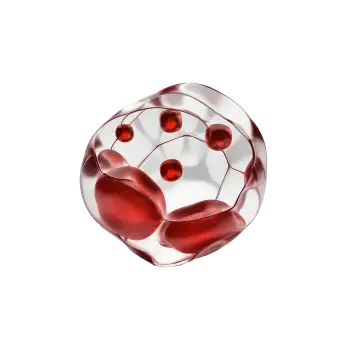Polycythemia - too many red blood cells
Primary polycythemia also called polycythemia vera is caused by a gene mutation in the bone marrow cells that leads to overproduction of red blood cells - an increased amount of erythrocytes. This condition, which can be detected by increased hemoglobin and hematocrit values, carries an increased risk of blood clots. The disease mainly affects adults between the ages of 50 and 75 and is more common in men than in women.
Secondary polycythemia
Often caused as a result of long-term lack of oxygen in the body, which can be due to lung diseases or living at high altitude. Other causes may include an increased production of erythropoietin (EPO), a hormone that stimulates the production of red blood cells that are sometimes secreted in higher concentration as a result of a tumor. EPO levels are used to investigate various conditions, such as polycythemia, where elevated or decreased values can provide important diagnostic information.
Symptoms of Polycythemia - Polycythemia vera
Disease develops gradually over time and may not cause any symptoms at all for several years. Many people experience only mild symptoms such as headaches, dizziness and fatigue, making it easy to overlook the condition.
- Fatigue
- Dizziness
- Red skin tone
- Itching, especially after bathing or showering
- Feeling of heaviness or fullness in the upper left part of the stomach
- Shortness of breath
These symptoms reflect the impact of polycythemia on the body and can vary depending on the individual's specific condition. When these signs appear, it is important to seek medical advice in order to get a correct diagnosis and adequate treatment. Polycythemia can have various causes, including genetic factors and changes in the body's production of blood cells.
When you live with polycythemia, you can experience a range of symptoms that affect your everyday life. You may feel unusually tired, even after resting, or experience dizziness that makes it difficult to focus. Your skin may take on an unusual red tone, which may be more noticeable after a hot bath or shower, where itching may also become prominent. A feeling of heaviness or fullness in the upper left side of the abdomen may indicate an enlarged spleen. Shortness of breath, especially during physical exertion, is also a common symptom that should not be ignored.
Investigations and tests to investigate polyctemia
To identify and or diagnose polycythemia, a series of different blood tests are usually performed to determine if the amount of red blood cells is abnormally high. This is important because many of the symptoms of polycythemia can be similar to those of other medical conditions. When a patient exhibits typical symptoms along with an elevated blood count, the doctor may suspect polycythemia.
Blood tests to identify polycythemia:
- Hemoglobin (Hb)
- Erythrocytes (red blood cells)
- Erythropoietin (EPO)
- Hematocrit
Treatment of polycythemia vera
The treatment of polycythemia vera aims to reduce symptoms and prevent blood clots by reducing the number of red blood cells. This is achieved via regular blood draws and drugs that slow down blood formation. Initially, blood draws may take place frequently, later at longer intervals depending on the blood values. Acetylsalicylic acid can be used to prevent blood clots. The treatment is lifelong and is individually adapted to enable as normal a life as possible.






















